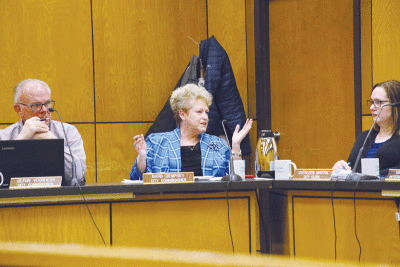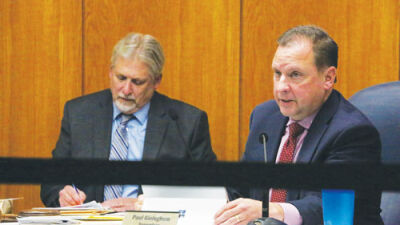
Mount Clemens City Commissioner Barb Dempsey speaks up during the April 3 meeting to discuss issues she has with approving the GFL Environmental Inc. waste services contract renewal. Her questions led to the item being tabled until more information is available.
Photo by Dean Vaglia
MOUNT CLEMENS — At its meeting on April 3, the Mount Clemens City Commission paved the way for the Administrative Hearings Bureau to have the force of law.
Two items directly handed by the commission, as well as two items approved through consent agenda, rounded out the legislative side of setting up the bureau, putting everything in place for it to become the city’s blight and property maintenance enforcement body by Monday, April 17.
First approved was the adoption of fees and fines associated with the bureau. First, second and third violations will cost $50, $100 and $200, respectively, if paid within 14 days and $75, $125 and $225, respectively, if paid after the 14-day period. Other approved charges include $75 for prosecution costs, if needed; a $10 state justice system assessment, as required by the state; and $50 fees for continuance/adjournments, show cause hearings, defaults, and any motion to set aside a default.
Officers for the bureau were set through consent agenda — Timothy Juengel and Stanley Hirt — and the commission unanimously voted to set the bureau officer pay rate at $65 an hour. The officers are expected to serve based on availability.
“Mr. Hirt will probably be the least one used,” Interim City Manager Gregg Shipman said. “They both work for Port Huron, and he does the least amount of work out of the ones they have at Port Huron because he’s obviously semiretired.”
The final Administrative Hearings Bureau item handled by commissioners was the second reading and approval of amendments to the city’s elimination of blight ordinance. The approved amendments change the ordinance to have the bureau serve as the blight enforcement mechanism.
Garbage pickup contract
A discussion on the residential garbage contract with GFL Environmental Inc. was tabled so more information can be brought to commissioners.
The Toronto-based waste services provider approached the board looking for a five-year extension of its contract with Mount Clemens, which expires on June 4. The current cost of residential pickup of trash, recycling and yard waste is $11.11 per household, and the extension would increase the cost to $12.99 per household by a rate of 3.5% annually.
Commissioner Barb Dempsey spoke concerning the lack of information about curb carts from GFL. While Public Services Director Jeffery Wood explained GFL allows the use of 32-gallon containers for trash pickup as long as the contents are less than 32 gallons, a request for pricing on specialty carts has gone without response. In order to wait for that information to come in, the commission voted to table the issue until a later meeting.
“I would like to (wait on a vote), at least so that we have some concrete information when people start to ask why we voted one way or the other or why we didn’t give them a choice,” Dempsey said. “I would feel more comfortable having that answer in front of me.”
Mentzer honored, gives legislative updates
On April 3, former city commissioner and current state Rep. Denise Mentzer was honored by the commission. She also gave updates on legislative developments.
Along with running through developments such as the repeal of “right to work” laws and the repeal of the state’s 1931 abortion ban, Mentzer explained how representatives from across multiple county-seat cities are working together on legislation to help with funding issues unique to their communities.
“We are working on finding the percentages of property in these host cities that is not taxable because it is county-owned property,” Mentzer said. “I have had meetings with SEMCOG (Southeast Michigan Council of Governments) and MML (Michigan Municipal League) to talk about this program. We would like to see a payment in lieu of taxes to each and every community that hosts county government, and we would like to see a sliding scale … and we would like to see a payment based on our population, our median income and the percentage of property.”
Mentzer does not think getting such legislation through will be easy — she said meetings with SEMCOG and the MML were “fractious” — but that she and other representatives are pursuing a PILOT program.
 Publication select ▼
Publication select ▼


















